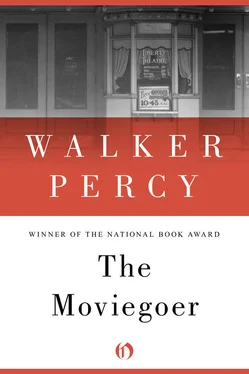Walker Percy - The Moviegoer
Здесь есть возможность читать онлайн «Walker Percy - The Moviegoer» весь текст электронной книги совершенно бесплатно (целиком полную версию без сокращений). В некоторых случаях можно слушать аудио, скачать через торрент в формате fb2 и присутствует краткое содержание. Год выпуска: 2011, Издательство: Open Road Media, Жанр: Современная проза, на английском языке. Описание произведения, (предисловие) а так же отзывы посетителей доступны на портале библиотеки ЛибКат.
- Название:The Moviegoer
- Автор:
- Издательство:Open Road Media
- Жанр:
- Год:2011
- ISBN:нет данных
- Рейтинг книги:5 / 5. Голосов: 1
-
Избранное:Добавить в избранное
- Отзывы:
-
Ваша оценка:
- 100
- 1
- 2
- 3
- 4
- 5
The Moviegoer: краткое содержание, описание и аннотация
Предлагаем к чтению аннотацию, описание, краткое содержание или предисловие (зависит от того, что написал сам автор книги «The Moviegoer»). Если вы не нашли необходимую информацию о книге — напишите в комментариях, мы постараемся отыскать её.
The Moviegoer — читать онлайн бесплатно полную книгу (весь текст) целиком
Ниже представлен текст книги, разбитый по страницам. Система сохранения места последней прочитанной страницы, позволяет с удобством читать онлайн бесплатно книгу «The Moviegoer», без необходимости каждый раз заново искать на чём Вы остановились. Поставьте закладку, и сможете в любой момент перейти на страницу, на которой закончили чтение.
Интервал:
Закладка:
Kinchen asks me if I am going to be in the Cracker Barrel. He is very nervous: it seems he is program chairman and somebody defected on him. He takes me aside.
“Would you do me a favor? Would you kick off with a ten minute talk on Selling Aids?”
“Sure.”
We shake hands and part good comrades.
But I have to get out of here, good fellows or no good fellows. Too much fellow feeling makes me nervous, to tell the truth. Another minute and the ballroom will itself grow uneasy. Already the cellophane stove has begun to glow ominously.
“I have to find Harold Graebner,” I tell Kate.
I grab her hand and slip out and away into the perilous out-of-doors, find the tiniest bar in the busiest block of the Loop. There I see her plain, see plain for the first time since I lay wounded in a ditch and watched an Oriental finch scratching around in the leaves — a quiet little body she is, a tough little city Celt; no, more of a Rachel really, a dark little Rachel bound home to Brooklyn on the IRT. I give her a pat on the leg.
“What?” she says, hardly paying attention — she is busy finding Harold’s address on the map and adding up the bar bill. I never noticed how shrewd and parsimonious she is — a true Creole.
“Sweet Kate,” say I patting her.
“All right, let’s go.” But she does not leave immediately. We have six drinks in two bars, catch buses, cross a hundred miles of city blocks, pass in the neighborhood of millions of souls, and come at last to a place called Wilmette which turns out not to be a place at all since it has no genie, where lives Harold Graebner the only soul known to me in the entire Midwest. Him, one soul in five million, we must meet and greet, wish good luck and bid farewell — else we cannot be sure we are here at all — before hopping off again into the maze of a city set down so unaccountably under the great thundering-lonesome Midwestern sky.
Off the bus and hopping along Wilmette happy as jaybirds, pass within a few feet of noble Midwestern girls with their clear eyes and their splendid butts and never a thought for them. What an experience, Rory, to be free of it for once. Rassled out. What a sickness it is, Rory, this latter-day post-Christian sex. To be pagan it would be one thing, an easement taken easily in a rosy old pagan world; to be Christian it would be another thing, fornication forbidden and not even to be thought of in the new life, and I can see that it need not be thought of if there were such a life. But to be neither pagan nor Christian but this: oh this is a sickness, Rory. For it to be longed after and dreamed of the first twenty years of one’s life, not practiced but not quite prohibited; simply longed after, longed after as a fruit not really forbidden but mock-forbidden and therefore secretly prized, prized first last and always by the cult of the naughty nice wherein everyone is nicer than Christians and naughtier than pagans, wherein there are dreamed not one but two American dreams: of Ozzie and Harriet, nicer-than-Christian folks, and of Tillie and Mac and belly to back.
We skip on by like jaybirds in July.
Harold lives in a handsome house in a new suburb back of Wilmette. His father left him a glass business in South Chicago and Harold has actually gotten rich. Every Christmas he sends a card with a picture of his wife and children and a note something like: “Netted better than thirty five thou this year — now ain’t that something?” You would have to know Harold to understand that this is not exactly a boast. It is a piece of cheerful news from a cheerful and simple sort of a fellow who can’t get over his good fortune and who therefore has to tell you about it. “Now ain’t that something, Rollo?” he would say and put up his hands in his baby-claw gesture. I know what he means. Every time American Motors jumps two dollars, I feel the same cheerful and expanding benevolence.
Since Kate and I can hardly wait to be back on our rambles, we visit with Harold about twenty minutes. As I said before, Harold loves me because he saved my life. I love him because he is a hero. I have a boundless admiration for heroes and Harold is the real thing. He got the DSC for a patrol action in the Chongchon Valley. Another lieutenant leading the fix patrol — I, you may as well know — got himself hung up; Lieutenant Graebner, who had the support patrol, came roaring up through the mortar fire like old Pete Longstreet himself and, using his three five rocket launcher like a carbine, shot a hole through the concertina (we were hung up on a limestone knob encircled by the concertina) and set fire to an acre or so of Orientals. When I say he is an unlikely hero, I don’t mean he is a modest little fellow like Audie Murphy — Audie Murphy is a hero and he looks like a hero. Harold is really unheroic — to such a degree that you can’t help but feel he squanders his heroism. Not at all reticent about the war, he speaks of it in such a flat unlovely way that his own experiences sound disappointing. With his somewhat snoutish nose and his wavy hair starting half way back on his head and his singsongy way of talking, he reminds me of a TV contestant:
M.C: Lieutenant, I bet you were glad to see the fog roll in that particular night.
HAROLD (unaccountably prissy and singsongy): Mr Marx, I think I can truthfully say that was one time I didn’t mind being in a fog about something (looking around at the audience).
M.C: Hey! I’m supposed to make the jokes around here!
Harold’s wife is a thin hump-shouldered girl with a beautiful face. She stands a ways off from us holding her baby, my godson, and hesitates between a sort of living room and a peninsula bar; she seems on the point of asking us to sit down in one place or the other but she never does. I keep thinking she is going to get tired herself, holding the big baby. Looking at her, I know just how Harold sees her: as beeyoutiful. He used to say that so-and-so, Veronica Lake maybe, was beeyoutiful — Harold is originally from Indiana and he called me peculiar Midwestern names like “heller” and “turkey”—and his wife is beautiful in just the same way: blond hair waving down her cheeks like a madonna, heavenly blue eyes, but stooped so that her shoulder-blades flare out in back like wings.
Harold walks up and down with both hands lifted up in the baby-claw gesture he uses when he talks, and there stands his little madonna-wife sort of betwixt and between us and the kids around the TV. But Harold is glad to see me. “Old Rollo,” he says, looking at the middle of my chest. “This is great, Rollo,” and he is restless with an emotion he can’t identify. Rollo is a nickname he gave me in the Orient — it evidently signifies something in the Midwest which is not current in Louisiana. “Old Rollo”—and he would be beside himself with delight at the aptness of it. Now it comes over him in the strongest way: what a good thing it is to see a comrade with whom one has suffered much and endured much, but also what a wrenching thing. Up and down he goes, arms upraised, restless with it and not knowing what it is.
“Harold, about the baby’s baptism—”
“He was baptized yesterday,” says Harold absently.
“I’m sorry.”
“You were godfather-by-proxy.”
“Oh.”
The trouble is there is no place to come to rest. We stand off the peninsula like ships becalmed — unable to move.
Turning my back on Harold, I tell Kate and Veronica how Harold saved my life, telling it jokingly with only one or two looks around at him. It is too much for Harold, not my gratitude, not the beauty of his own heroism, but the sudden confrontation of a time past, a time so terrible and splendid in its arch-reality; and so lost — cut adrift like a great ship in the flood of years. Harold tries to parse it out, that time and the time after, the strange ten years intervening, and it is too much for him. He shakes his head like a fighter.
Читать дальшеИнтервал:
Закладка:
Похожие книги на «The Moviegoer»
Представляем Вашему вниманию похожие книги на «The Moviegoer» списком для выбора. Мы отобрали схожую по названию и смыслу литературу в надежде предоставить читателям больше вариантов отыскать новые, интересные, ещё непрочитанные произведения.
Обсуждение, отзывы о книге «The Moviegoer» и просто собственные мнения читателей. Оставьте ваши комментарии, напишите, что Вы думаете о произведении, его смысле или главных героях. Укажите что конкретно понравилось, а что нет, и почему Вы так считаете.












